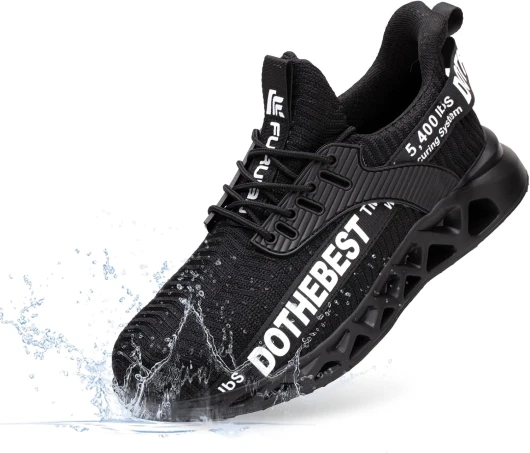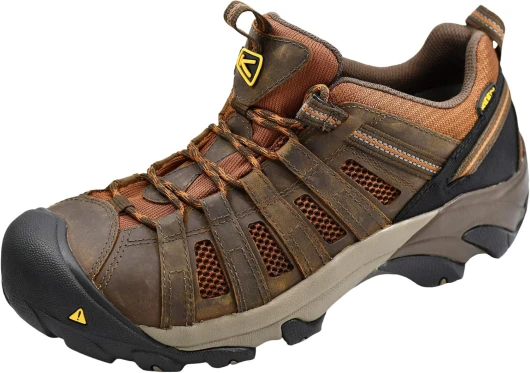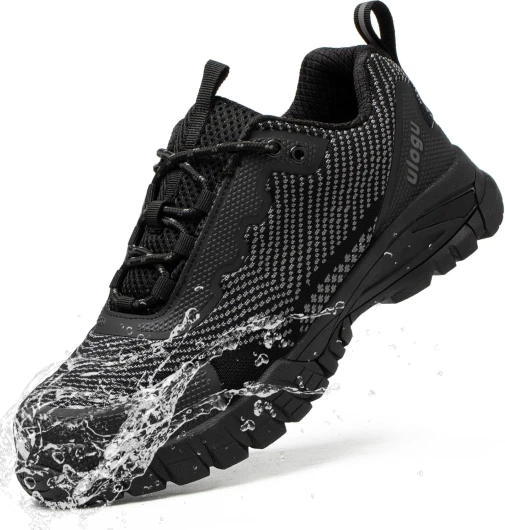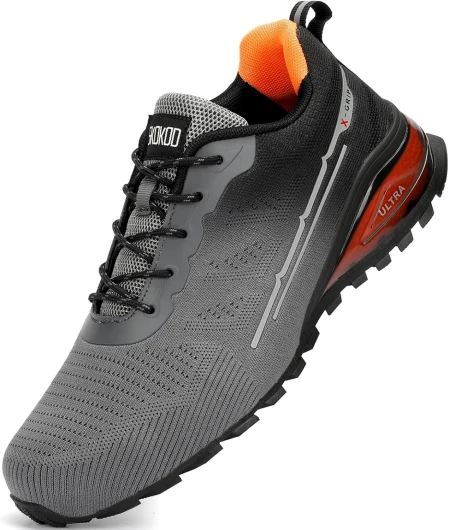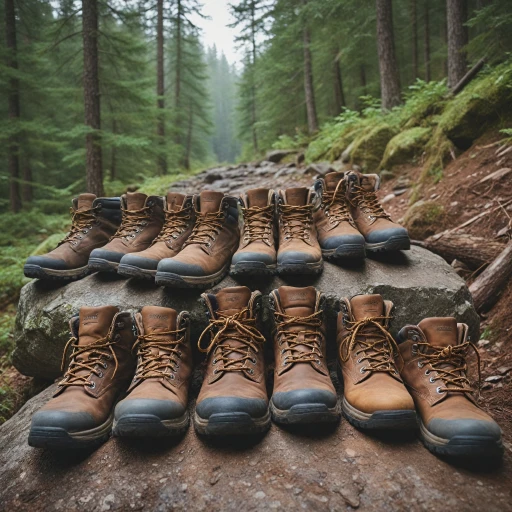
Understanding the Need for Steel Toe Protection in Hiking
Why Steel Toe Protection Matters in Hiking
When it comes to hiking, safety is a paramount concern for any outdoor enthusiast. While traditional hiking boots offer a range of protective features, steel toe hiking shoes introduce an additional layer of safety that can be crucial in certain environments. The inclusion of a steel toe cap in hiking footwear is designed to protect your feet from unexpected impacts and compression, which can occur when navigating rocky terrains or during accidental slips.
Enhanced Safety Features
Steel toe hiking shoes are particularly beneficial for hikers who frequently traverse challenging trails where the risk of falling rocks or heavy objects is higher. These shoes are engineered to withstand significant force, providing peace of mind when you're deep in the wilderness. Additionally, many steel toe options come with waterproof features, ensuring your feet remain dry in wet conditions, which is a common concern for hikers.
Comparing with Traditional Hiking Boots
While traditional hiking boots are known for their durability and comfort, they often lack the reinforced protection that steel toe variants offer. For those who prioritize safety, especially in unpredictable environments, the choice between regular boots and steel toe options can be pivotal. However, it's essential to weigh the pros and cons, as steel toe boots can be heavier, which might affect your hiking experience.
Considerations for Different Hikers
It's important to note that not all hikers may need steel toe protection. For those engaging in light trekking or well-maintained trails, regular hiking boots might suffice. However, for individuals venturing into rugged terrains or combining hiking with work-related activities, such as trail maintenance, the added protection of steel toe boots can be invaluable.
For more insights on choosing the right footwear for your hiking adventures, you might find this comprehensive guide helpful.
Comparing Steel Toe Hiking Shoes to Traditional Hiking Boots
Evaluating the Differences Between Steel Toe and Traditional Hiking Boots
When it comes to hiking footwear, the choice between steel toe hiking shoes and traditional hiking boots can be pivotal for both safety and comfort. Understanding these differences can help you make an informed decision tailored to your hiking needs.
Protection and Safety
Steel toe hiking shoes offer enhanced protection, particularly in rugged terrains where the risk of toe injuries from falling rocks or sharp objects is higher. The steel toe cap acts as a shield, providing a safety toe feature that is crucial for preventing injuries. In contrast, traditional hiking boots may not offer the same level of protection, making them less suitable for environments where toe safety is a priority.
Material and Durability
Traditional hiking boots often come in a variety of materials, including leather and synthetic options, each offering different levels of durability and comfort. Steel toe hiking shoes, on the other hand, are typically constructed with robust materials like leather and composite, ensuring they can withstand harsh conditions while offering waterproof features. This makes them ideal for hikers who frequently encounter wet or muddy trails.
Comfort and Weight
Comfort is a significant factor for any hiker. Steel toe hiking shoes might be heavier due to the steel cap, which can affect long-distance hiking comfort. However, advancements in design have led to lighter composite toe options that offer similar protection without the added weight. Traditional hiking boots, while generally lighter, may lack the quick safety features of steel toe options.
Cost Considerations
Price is another factor to consider. Steel toe hiking shoes often come at a higher regular price due to their enhanced safety features. However, they can be a worthwhile investment for those prioritizing toe protection. Traditional hiking boots might be more budget-friendly but could incur additional costs if supplementary safety gear is needed.
Style and Aesthetics
Both steel toe and traditional hiking boots come in various colors and styles, catering to different preferences. From boot brown to more vibrant colors for men, there's something for every hiker. Brands like Keen Utility offer a range of options that combine style with functionality, ensuring you don't have to compromise on aesthetics for safety.
For a comprehensive review of a popular hiking boot option, consider exploring the Salomon X Ultra 4 GTX, which provides insights into features that might align with your hiking needs.
Key Features to Look for in Steel Toe Hiking Shoes
Essential Attributes of Steel Toe Hiking Shoes
When selecting steel toe hiking shoes, it's crucial to focus on specific features that ensure both safety and comfort. These shoes are designed to protect your feet from various hazards while providing the necessary support for long treks. Here are some key attributes to consider:
- Toe Protection: The primary feature of these shoes is the steel toe cap, which offers robust protection against impacts and compression. For those seeking lighter options, composite toe alternatives are available, providing similar safety without the added weight.
- Waterproofing: A must-have for any hiker, waterproof materials keep your feet dry in wet conditions. Look for products labeled as waterproof work boots or waterproof composite options to ensure durability in various environments.
- Material Quality: High-quality leather or synthetic materials are essential for longevity and comfort. Leather boots, especially in boot brown, are popular for their classic look and durability.
- Slip Resistance: A slip-resistant sole is crucial for maintaining stability on slippery surfaces, reducing the risk of falls and injuries.
- Comfort and Fit: Ensure the boots fit well and provide adequate cushioning. Features like quick lace systems can enhance convenience and fit.
- Electrical Hazard Protection: For those who work in environments with electrical risks, look for boots with electrical hazard protection.
- Price and Shipping: Consider the regular price and look for deals offering free shipping to get the best value for your investment.
By focusing on these features, you can find a pair of steel toe hiking shoes that meet your needs, whether you're a casual hiker or a seasoned trekker. Remember, the right footwear can significantly enhance your hiking experience, providing the safety and comfort you need on the trail.
Top Brands Offering Steel Toe Hiking Shoes
Leading Brands in Steel Toe Hiking Footwear
When it comes to steel toe hiking shoes, several brands stand out for their commitment to safety and comfort. These companies offer a range of products that cater to the needs of outdoor enthusiasts, experienced hikers, and mountaineers. Here’s a look at some top brands that have made a mark in this niche.
- Keen Utility: Known for their durable and comfortable designs, Keen Utility offers a variety of steel toe and composite toe options. Their hiking boots are often waterproof and slip-resistant, making them ideal for challenging terrains. The brand is popular among men looking for reliable work boots that double as hiking footwear.
- Timberland PRO: Timberland PRO is synonymous with quality and durability. Their steel toe boots are crafted with premium leather and are designed to withstand electrical hazards. With features like waterproofing and quick-dry technology, these boots are a favorite among those who prioritize safety and comfort.
- Caterpillar: Caterpillar offers a range of steel toe work boots that are perfect for both hiking and work environments. Known for their rugged construction and safety features, these boots are available in various colors, including classic brown. They often come with free shipping, making them an attractive option for budget-conscious buyers.
- Wolverine: Wolverine is a trusted name in the world of work boots. Their products are designed to offer maximum protection with features like composite toe and waterproofing. The brand is known for its competitive pricing and regular discounts, making it accessible to a wide range of customers.
These brands not only focus on the essential features like steel toe protection and waterproof capabilities but also ensure that their products are stylish and comfortable. Whether you're looking for a boot in a classic brown or something more modern, these companies offer a variety of options to suit your needs.
Pros and Cons of Using Steel Toe Hiking Shoes
Advantages of Steel Toe Hiking Shoes
- Safety First: The primary benefit of steel toe hiking shoes is the enhanced protection they offer. Whether you're navigating rocky terrains or dense forests, the steel toe acts as a shield against unexpected impacts and potential hazards.
- Durability: These shoes are built to last. With robust materials like leather and composite, they can withstand the wear and tear of regular hiking and even more demanding conditions.
- Versatility: Many steel toe hiking shoes double as work boots, making them a practical choice for those who need footwear that transitions from trail to worksite. This versatility is particularly beneficial for men who require safety toe features in both environments.
- Waterproof Options: Several models come with waterproof features, ensuring your feet stay dry in wet conditions. This is a crucial feature for hikers who often encounter streams or muddy paths.
- Slip Resistance: The slip-resistant soles provide excellent traction, reducing the risk of slips and falls on uneven or slippery surfaces.
Drawbacks to Consider
- Weight: Steel toe hiking shoes tend to be heavier than regular hiking boots. This added weight can lead to quicker fatigue, especially on longer treks.
- Price Point: These shoes often come at a higher price compared to traditional hiking boots. While the investment might be justified by their durability and safety features, it's something to consider if you're on a budget.
- Comfort: Some hikers find steel toe shoes less comfortable due to the rigid toe cap. However, advancements in design have led to more comfortable options, such as those with composite toes.
- Limited Color Options: While function is the priority, the aesthetic appeal might be limited. Most steel toe hiking shoes come in basic colors like brown or black, which might not suit everyone's style preferences.
In conclusion, while steel toe hiking shoes offer significant safety benefits, they also come with considerations like weight and price. It's essential to weigh these pros and cons based on your specific hiking needs and preferences.
Tips for Maintaining Your Steel Toe Hiking Shoes
Preserving the Integrity of Your Steel Toe Hiking Shoes
Maintaining your steel toe hiking shoes is crucial to ensure they remain both safe and comfortable for your adventures. Here are some practical tips to help you keep them in top condition:
- Regular Cleaning: After each hike, remove dirt and debris from your boots. Use a soft brush or cloth to clean the leather and toe areas. This prevents buildup that can degrade the material over time.
- Waterproofing: Even if your boots are marketed as waterproof, it's wise to apply a waterproofing spray regularly. This helps maintain the waterproof composite features and protects against unexpected weather conditions.
- Inspect for Damage: Regularly check for any signs of wear, especially around the steel toe and sole. Look for cracks or separation in the leather or composite materials that could compromise safety.
- Proper Storage: Store your boots in a cool, dry place. Avoid leaving them in direct sunlight or damp areas, as this can cause the leather to crack and the steel components to rust.
- Replace Insoles: Over time, insoles can wear out, affecting comfort and support. Consider replacing them with high-quality insoles designed for hiking boots.
- Addressing Odor: To combat odor, use a deodorizing spray or insert odor-absorbing insoles. This is especially important for boots men who frequently hike in humid conditions.
- Check Laces and Eyelets: Ensure that laces are in good condition and replace them if they show signs of fraying. Also, inspect eyelets for any damage that could affect the fit and safety of your boots.
By following these maintenance tips, you can extend the life of your steel toe hiking shoes and ensure they continue to provide the protection and comfort you need on your hikes. Remember, investing time in maintenance is just as important as choosing the right product at the right price.

